American Horror Story: 1984 - the latest installment in FX's long-running horror anthology series - is tackling the slasher genre, doling out a story about horned up summer camp counselors, a bible-thumping camp owner, an escaped mental patient, and potentially dueling villains, one made-up (Mr. Jingles), the other an actual based-in-history serial killer (the Night Stalker. Other than the fact that Emma Roberts is actually playing the sweet-natured, presumptive Final Girl instead of the queen bitch, it's mostly what you've come to expect from the reliably wacky , minus the usual presence of AHS usuals like Evan Peters and Sarah Paulson. It's not entirely clear how involved executive producers Ryan Murphy and Brad Falchuk are since they've each left Fox for Netflix, but the season premiere gives them a by-line indicating they're around enough to set things in a suitably campy direction.
But didn't Murphy and Falchuk already do a slasher homage? In a world in which two seasons of Scream Queens already exist, why do we need AHS: 1984 other than yet more 80s nostalgia - example: remember aerobics classes and spandex? And in a world in which slashers deconstructions like Scream, Behind the Mask: The Rise of Lesley Vernon, Cabin in the Woods, Final Girls, and You Might Be the Killer have acknowledged, honored, and often times subverted the rules of the genre, can you really do a straight-forward slasher homage anymore? For the moment, AHS: 1984 appears to be exactly that: a simple, if hyper-caffeinated homage. Netflix's Slasher series, by comparison,at least tries to update the genre for today and seriously goes for it in the gore department, not always successfully.
The whole experience, however, has left me contemplating the slasher genre in general. As someone who was born in the 80s but came of age in the 90s, I lived through the genre's heyday, its meta, VHS-era revival, and inevitable remake train of the early aughts. I have devoted untold hours of my life and literally thousands of words to this most teenage-oriented of horror genres, yet as an adult, I look at your average slasher now and see a genre that's just not my jam anymore. The nostalgia, though, she be powerful.
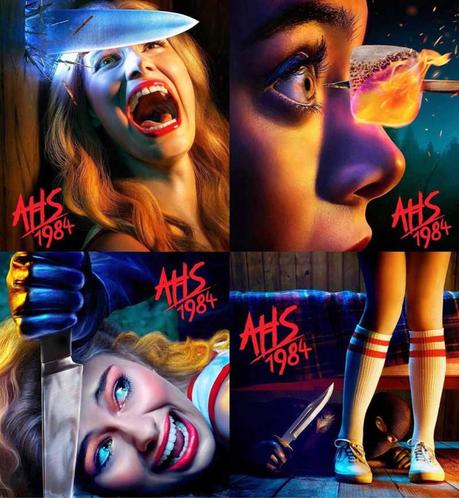
In the documentary Going to Pieces: The Rise and Fall of the Slasher, director Herb Freed - the filmmaker behind such 80s also-rans as Beyond Evil and the sex comedy Tomboy - claims his one experience with the slasher genre, 1981's Graduation Day, convinced him to never again revisit the stalk/slash/kill branch of the horror world. "It was a little too scary for me to be in the audience of a real horror film, like Graduation Day, and seeing some of the reactions. What it unleashes is truly scary. "There's a great expression in Hebrew," he shares, "which is 'it was good, but it's good that it was.'"
Standing in the back of a theater and watching people cheer the brutal deaths of the people on-screen is certainly not for everyone, especially if you're the guy who made the movie and didn't quite realize what you'd unleashed into the world. However, from the times of the gladiators to the excessive blood-letting of the Grand Guignol theater to the slashers of the 80s, humans are drawn to violence in their entertainment. It's cathartic. It doesn't mean we're going to kill people just like in the movie. Most of us just need a good, controlled scare from time to time, and for some, nothing is better at that than a slasher with a steady supply of clever - and often not-so-clever - jump scares.
I'm...not one of those people, mostly because I don't really jump at horror movies, or at least I haven't since I was young enough to find Freddy Krueger terrifying. If you want to truly fuck me up these days, show me an Ari Aster movie or a scene of extreme gore or animal cruelty and I'll squirm in my seat. Otherwise, I have officially entered into that territory where, like Homer Simpsons, the only campfire story which scares me is how much it'll cost to put my hypothetical kids through college.
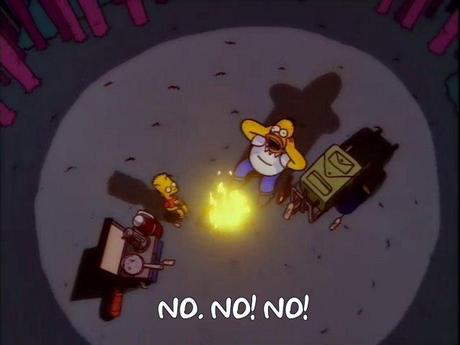
Yet, the slasher does have a nostalgic hold on me. It's often said that the most meaningful pop culture - movies, music, TV, etc. - you'll ever experience is what you consume during your most formative years when your life is still ahead of you and your mind still on the right side of malleable. By the time you hit your thirties or forties, however, you might be vaguely curious if that one band you used to like back in the day drops a new album, but you can't respond to it with the same naive, Garden State-esque "this song will change your life" wanderlust of your youth.
That's where I'm at with slasher movies. I will always be kind of curious to see a new Michael Myers, Jason Vorhees, or Freddy movie, but the seams are more obvious to me now and the rote formula far more glaring. They don't mean as much to me anymore - the bogeyman of my youth are now just fondly remembered totems of a different age, and today the empty-headed delights of a Friday the 13th movie seem more empty-headed than I remember.
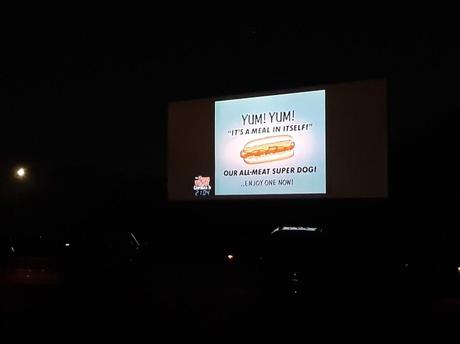
I, for example, recently attended a drive-in theater marathon of Friday the 13th: Part 2-4 - hastily thrown together sequels released in 1981, '82 and '84 respectively - and apart from the inclusion of a child character in the last one it truly felt like watching the same exact movie three times in a row. The same formula plays out with minor variation: boobs are shown, the sexually promiscuous are punished, the virtuous spared, and the bad guy dies only to come back again and again. I used to enjoy this predictability. Now, it comes off as boring when watched in a marathon setting. (Also, I hadn't fully appreciated just how faithful Friday the 13th: The Video Game is until revisiting some of these earlier movies.)
These are the ones everyone, myself included, usually refers to as the "good Friday movies," yet I actually found myself longing for the later, wonkier sequels where Jason is a zombie, one Final Girl has telekinetic powers, and Manhattan sewage somehow turns a grown man into a little boy. (Feels like the type of thing the EPA should look into.) They're objectively bad movies, but when the inmates are allowed to run the asylum you at least get some unpredictable, crazy results that'll send you out laughing.
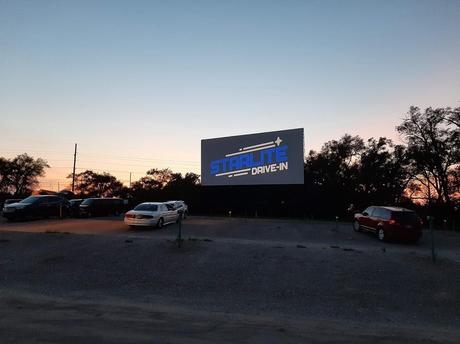
The people around me at the drive-in didn't seem to need such campiness to laugh, though. A lot of them seemed to feel Friday the 13th: 2-4 inherently provide plenty to laugh at already - bad acting, cliched storytelling, and plenty of "gotcha!' fake jump scares. Other - most specifically the teenagers dragged by their nostalgia-mining parents - used the time to walk around and chat with friends. Whatever was happening up on the screen was a secondary concern, at best.
Few get to experience a slasher movie in that environment simply because there are so few drive-in theaters left - just about 300, down from a high of 4,000 four decades ago. Personally, this was only my fourth visit to my local drive-in, and it was only possible because of an internet campaign to save the place from going out of business last year. I don't know how much longer this particular drive-in will be around, but seeing a couple of Jason movies in that setting reminded me of the grindhouse spirit underneath it all. These are movies meant for intermittent enjoyment, with scripts and characters you can ignore as you make out, chat with friends, or take a trip to the concession stand before looking up again whenever the scary music tells you another kill is about to happen. We've traded the drive-ins for our own home theaters, but it doesn't change the way these movies were meant to be consumed.
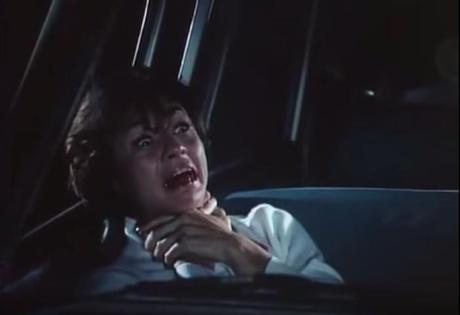
It's not all kill scenes, all the time. Other slashers of that 80s era often have the whodunit of their Giallo predecessors, like mixing an Agatha Christie murder mystery with a Lizzie Borden massacre as performed in the Grand Guignol. Figuring out who the killer is at least adds another layer of enjoyment to movies like Sleepaway Camp (I Heart Felissa Rose 4Ever) and Happy Birthday to Me, something the franchises obviously lack as they progress beyond their initial installments.
If you venture further back, the slashers of the 70s - from the well-known ( Black Christmas, Texas Chainsaw Massacre, Alice, Sweet Alice) to the super obscure (Deranged, The Love Butcher, Horror High, Ruby) - are far more eclectic. As Paul Corupe argues in the most recent Rue Morgue magazine, "The 1970s proto-slashers are unencumbered by many of that tropes that, by Scream, had become cliche. After all, you can't play by the rules when you're too busy writing them."
Even before you get to Scream, however, at least the Nightmare on Elm Street movies play around with impressionistic imagery and the Hellraisers get seriously twisted in their own perverse kinks. Plus, by the time you get to Child's Play the slasher is just pure camp, and while the post- Scream era led to annoyingly smug copycats we've been blessed in recent years by one exceedingly clever deconstruction ( Final Girls) after another ( You Might Be the Killer) as well as several TV show versions (MTV's Scream, Netflix's Slasher) to appease the hardcore.
The point is there is enough variation across the board to not dismiss the genre entirely just because three Friday the 13th sequels are basically the same movie. However, as an adult watching a slasher, I'm still reminded that this is the thing that used to scare me as a kid. The predictable thrills are charming instead of horrifying now.
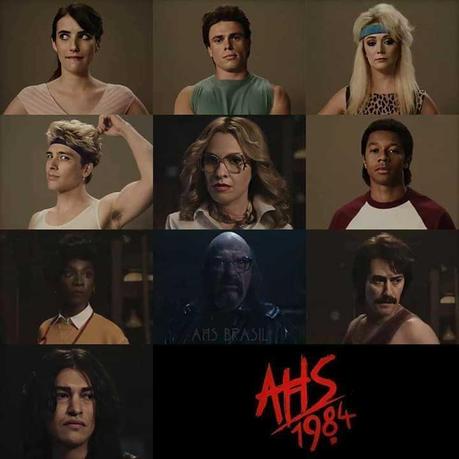
I have no idea what AHS: 1984 is going to do with all of that. The first episode is basically Halloween meets Friday the 13th nostalgia for nostalgia's sake. There are hints, if you look hard enough, that we could be heading for some broad commentary on the era and what exactly made the slasher so popular. The opening credits, for example, unspool a cleverly-edited 80s pop-culture collage with more than a couple Reagan references. The actual first episode includes a random reference to Charles Keating - an anti-pornography, anti-Larry Flynt crusader who later went to prison for fraud, racketeering, and conspiracy - and features the somewhat shoehorned inclusion of 80s serial killer/rapist Richard "Night Stalker" Ramirez as an actual character.
Going forward, however, if AHS: 1984 plays out like a normal Ryan Murphy show it will probably shift gears into some completely bonkers ideas for the next couple of episodes and then lose focus before limping to a barely realized conclusion, the byproduct of a workaholic producer who has 13 different projects in some stage of production/development on his work calendar through April of next year. (Even in this era of the uber-producer, 13 different shows or movies at once still registers as a lot.)
In a recent Time Magazine profile, Murphy tried to disempower his critics, "Call me camp. Call me crazy. Call me wild. Call me extreme. Call me erratic. The one thing you can't say it that I don't try." He paused a beat before laughing and concluding, "Actually, I don't care what you call me. As long as you call me."
I've seen enough to know that his work is wildly hit or miss, not just show to show but episode to episode. American Horror Story has been no different, but the nostalgic pull of the slasher drew me back in this season. After the first episode, I'm curious to see where the nostalgia will end and the genuinely new storytelling will begin. I fear that might never truly happen, but I'll stick it out for a couple more episodes to find out. After Scream Queens, I'm not overly optimistic.
What about you? What is your favorite American Horror Story season, if you have one? And are you increasingly tired of the slasher genre, just as in love with it as ever, or never got the appeal in the first place? Let me know in the comments.
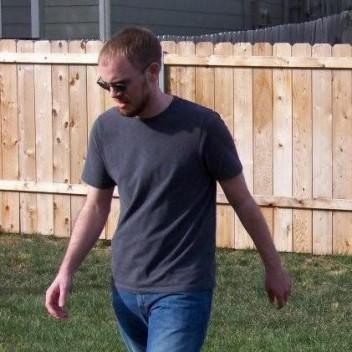
Grew up obsessing over movies and TV shows. Worked in a video store. Minored in film at college because my college didn't offer a film major. Worked in academia for a while. Have been freelance writing and running this blog since 2013. View all posts by Kelly Konda

